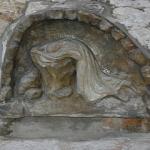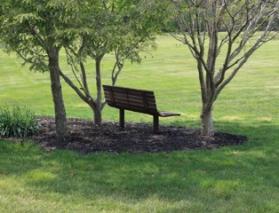
Fig trees were a common and popular food source in Christ’s Israel. The fruitbuds develop before the leaves appear, so approaching a fig tree with leaves, one would expect fruit.1 But Jesus came upon a fig tree with abundant, showy leaves and no fruit. Like so many of the Savior’s significant symbols, the fruitless fig tree became a profound lesson with many layers of meaning to be applied to different people in different ways. He “cursed” the fig tree that it would never again have fruit—and when he passed again it had withered away. This destruction taught of fruit or faith, infinite love, and Israel’s ultimate destruction.
Hunger Beyond Figs
The “cursed” tree could relate to daily food scarcity or to famine to come, due to lack of righteousness or faith. The experience is related in Mark (11:13-15; 20-23) and in Matthew (21:18-28) as a narrative taking place on the way to or from Jerusalem in the final week of Christ’s life. Luke (13:4-9) presented it as a parable told by the Savior much earlier in His ministry.
The narrative accounts say that Jesus was hungry and wanted food for strength. Luke presents the fig tree parable as Christ’s response to news of 18 people killed in an accident, who had sinned no more than others throughout Jerusalem: “except ye repent, ye shall all likewise perish.”
This parable tells of a man who had a vineyard with a fruitless fig tree and a vineyard “dresser” who begged him not to “cut it down” but to leave it for another year to allow him to try to save it. The parable does not tell whether the tree was healed and saved or not.
Carol Monaco, a Catholic writer, chose a positive meaning to conclude it.
I prefer the parable that holds out hope for future figs. Here we see God’s patience. Like the fig tree, each of us has a purpose and our Lord provides what we need to fulfill our purpose. “For every tree is known by its own fruit. A good person out of the store of goodness in his heart produces good, but an evil person out of a store of evil produces evil.”
Therefore, how do we respond? God gives us free will to act. We can grow and mature in truth and goodness when we are rooted in God’s love.2
Faith Within God’s Love
The fate of a fig tree and of most of us—fruitless, fruitful and/or faithful?
Power of Faith Over Nature
Christ knew that his apostles and other followers would suffer extreme physical and mental challenges. To prepare them, he applied the cursed fig tree to teach them to use righteousness and /or faith in miraculous ways.
As these followers marveled at His power over a fig tree, according to Mark (11:13-15, 20-23) Jesus assured them,
Have faith in God . . . . whosoever shall say unto this mountain, Be thou removed, and be thou cast into the sea; and shall not doubt in his heart, but shall believe that those things . . . shall come to pass, he shall have whatsoever he saith.
Matthew reported the same happening and assurance, adding, “And all things, whatsoever ye shall ask in prayer, believing, ye shall receive.” They would carry this promise to endure persecution and to enable miracles challenging their courage or faith.
Luke followed his fig tree parable with the mustard seed application: A smaller seed and much larger tree. Human effort—divine strength.
God’s Concern for Our Needs
Many years ago I taught kindergarten, as the token non-Episcopalian teacher in an Episcopalian private school in Texas. Before eating, our young children sang this song:
The Lord is good to me/And so I thank the Lord For giving me the things I need/ The sun and the rain and the apple seed. The Lord is good to me.
I wish my children had sung this song in primary with lessons of gratitude or faith. For apple trees or fig trees, the Lord provides what we need to produce fruit. He may not give us fully-developed fruit, but he gives us what we need to grow the fruit—physical, mental, spiritual.
Prophecy to Warn Israel
During Israel’s captivity in Babylon, Old Testament prophet Jeremiah received a vision of two baskets of figs in front of the temple. Ripe, desirable figs filled one basket; figs so “evil” they could not be eaten were in the other.
The Lord explained that he had sent some of the captive Israelites “into the land of the Chaldeans for their good.”
I will build them, and not pull them down; and I will plant them, and not pluck them up. And I will give them an heart to know me, that I am the Lord: and they shall be my people, and I will be their God: for they shall return unto me with their whole heart. (Jeremiah 24:6-7)
These were the “good” figs.
The evil figs, “I will deliver . . . to be removed into all the kingdoms of the earth for their hurt, to be a reproach and a proverb, a taunt and a curse in all places whither I shall drive them.”
This contrast in figs continued in Christ’s ministry. Good figs from good trees prospered spiritually. But a lot of fruitless trees were disguising themselves behind impressive leaves, with no fruits of righteousness or faith.
Hypocrisy in “high places” robbed many of the spiritual nutrients they needed, while proclaiming religious laws and leadership without true doctrine, comfort, or faith. Prophets warned of Israel’s fall, the Savior foretold Israel’s fall, and Israel fell.
How much truth can be found in fig trees? More than most of us can realize.













